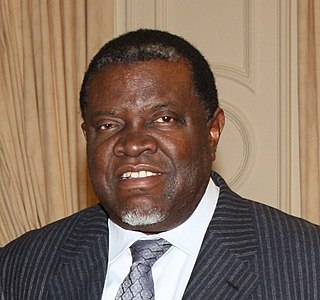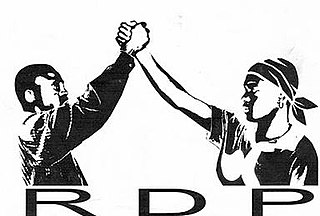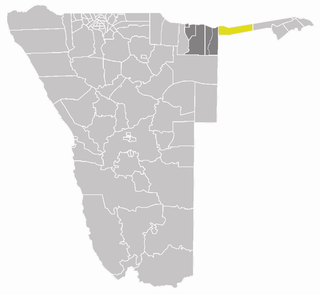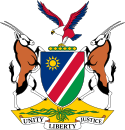
Politics of Namibia takes place in a framework of a semi-presidential representative democratic republic, whereby the President of Namibia is both head of state and head of government, and of a pluriform multi-party system. Executive power is exercised by both the President and the Government. Legislative power is vested in both the Government and the two chambers of Parliament. The judiciary is independent of the executive and the legislature.
Theo-Ben Gurirab was a Namibian politician regarded as one of the founding fathers of that Republic. He served as the second Prime Minister of Namibia from 28 August 2002 to 20 March 2005, following the demotion and subsequent resignation of Hage Geingob. Previously he was the country's first Minister of Foreign Affairs from 1990 to 2002, and was President of the United Nations General Assembly from 1999 to 2000. He was Speaker of the National Assembly of Namibia from 2005 to 2015. Gurirab retired from political life in 2015.

Karasburg was a constituency in the ǁKaras Region of Namibia, with a population of 16,000. The main towns were Karasburg and Grünau; other populated places included Warmbad and Aussenkehr, and the border settlements of Ariamsvlei and Noordoewer. The Orange River formed part of the southern border of this constituency.
Hidipo Livius Hamutenya was a Namibian politician. A long-time leading member of the South West Africa People's Organization (SWAPO), Hamutenya was a member of the Cabinet of Namibia from independence in 1990 to 2004. He was defeated in a bid for the party's presidential nomination in 2004 and left SWAPO to form an opposition group, the Rally for Democracy and Progress (RDP), in 2007. He was elected to the National Assembly of Namibia with RDP in the 2009 general election. He was forced to step down as RDP President on 28 February 2015 and rejoined SWAPO on 28 August 2015.

Hifikepunye Lucas Pohamba is a Namibian politician who served as the second President of Namibia from 21 March 2005 to 21 March 2015. He won the 2004 election overwhelmingly as the candidate of SWAPO, the ruling party, and he was re-elected in the 2009 election. Pohamba was the president of SWAPO from 2007 until his retirement in 2015. Pohamba is a recipient of the Ibrahim Prize.

Elections in Namibia gives information on election and election results in Namibia.
Marco Mukoso Hausiku is a Namibian politician who was Deputy Prime Minister of Namibia from 2010 to 2015. Previously he served as Minister of Foreign Affairs from 2004 to 2010. In 2017 he was elected Deputy Secretary-General of the Swapo Party at the party's 6th Congress.
The Popular Democratic Movement (PDM), formerly the Democratic Turnhalle Alliance and DTA of Namibia, is an amalgamation of political parties in Namibia, registered as one singular party for representation purposes. In coalition with the United Democratic Front, it formed the official opposition in Parliament until the parliamentary elections in 2009. The party currently holds five seats in the Namibian National Assembly and is the official opposition. McHenry Venaani is president of the PDM.
The United Democratic Front (UDF) is a political party in Namibia. Justus ǁGaroëb is the party's leader since its foundation in 1989. He stepped down in 2013.

Hage Gottfried Geingob is the third and the current President of Namibia, in office since 21 March 2015. Geingob was the first Prime Minister of Namibia from 21 March 1990 to 28 August 2002, and he served as Prime Minister again from 4 December 2012 to 21 March 2015. Between 2008 and 2012 Geingob served as Minister of Trade and Industry. He was Vice-President of the South West Africa People's Organization (SWAPO) between 2007 and 2015 and became acting President in 2015 when his predecessor, Hifikepunye Pohamba, stepped down.

The Rally for Democracy and Progress is an opposition political party in Namibia. It was launched on November 17, 2007 under the leadership of Hidipo Hamutenya and Jesaya Nyamu, both former leading members of the ruling SWAPO party and cabinet ministers. Hamutenya had unsuccessfully sought the SWAPO nomination for President in 2004. At the time of the RDP's launch, it was considered to represent the strongest challenge to SWAPO's political dominance since the country gained its independence in 1990. According to Hamutenya, speaking at the RDP's launch, the party was "born in response to our people's deep longing for a vision, political direction and the rekindling of their hopes and aspiration for a better and prosperous future".

A presidential and parliamentary election was held on 27–28 November 2009 in Namibia. It was the fourth general election since independence and the fifth democratic election. Voting ended on 28 November and official election results, released on 4 December, showed that Hifikepunye Pohamba and his SWAPO Party were re-elected, each with over 75% of the vote. Prior to the election, the South West Africa People's Organization (SWAPO) was widely expected to score a landslide victory, with the Rally for Democracy and Progress (RDP) considered SWAPO's biggest challenger. Fourteen political parties competed for seats in the National Assembly of Namibia, and twelve candidates ran for the Presidency.

Aroab is a village with a population of approximately 5,000 in the ǁKaras Region of southern Namibia. It is situated about 170 kilometres (110 mi) south-east of Keetmanshoop on the edge of the Kalahari desert; the average annual rainfall is about 150-200 mm. Aroab is the district centre of the Keetmanshoop Rural electoral constituency.

Mukwe is a constituency in the Kavango East region of Namibia. It has 26.000 inhabitants, the district centre is the settlement of Mukwe.

General elections were held in Namibia on 28 November 2014, although early voting took place in foreign polling stations and for seagoing personnel on 14 November. The elections were the first on the African continent to use electronic voting.
Daweb Constituency is an electoral constituency in the Hardap Region of Namibia. It was created in August 2013, following a recommendation of the Fourth Delimitation Commission of Namibia, and in preparation of the 2014 general election. The administrative centre of Daweb Constituency is the village of Maltahöhe.
Rosina ǁHoabes is a Namibian politician.

General elections will be held in Namibia in November 2019. The elections will be the second on the African continent to use electronic voting.












